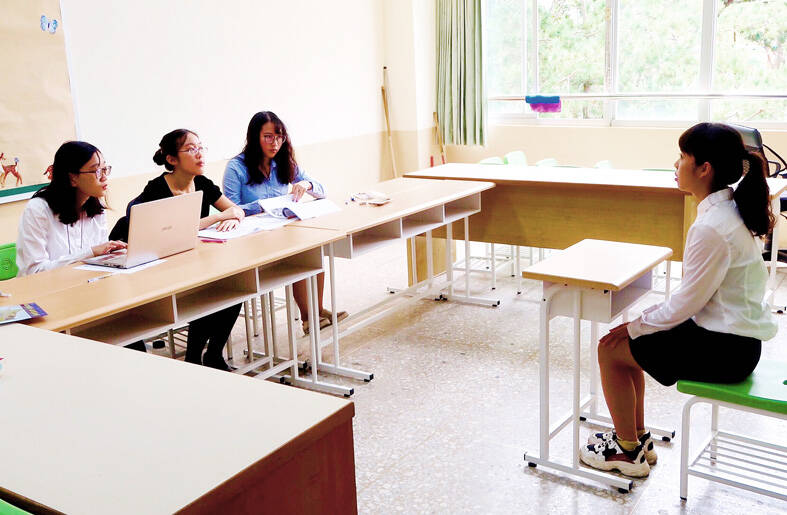About 30.2 percent of new college graduates searching for work have been victims of sexual harassment — both verbally and physically — during job interviews, a poll by the online job bank yes123 showed.
The poll showed 31.8 percent of respondents said they were asked if they had any “unmentionable diseases” or “experienced pain during their periods,” and another 27.3 percent said the interviewees made inappropriately lewd jokes.
Another 25.2 percent of respondents said they were asked about their sexual orientation during the interview process, while 23.9 percent said interviewers asked about their measurements, height or weight, the poll showed.

Photo courtesy of Chinese Nationalist Party (KMT) Legislator Ma Wen-chun
A total of 21.8 percent of respondents said interviewers had put their hands on their shoulders, 20.5 percent said interviewers had touched or tried to hold heir hands, 18.4 percent said that interviewers caressed their backs, and 9.4 percent said interviewers groped their buttocks, the poll showed.
According to the poll, 16.3 percent of respondents said interviewers had asked that they join them to share meals or have drinks, and 10.5 percent said they were asked to go on trips with the interviewers.
The poll showed 87.7 percent of jobseekers said they were asked private questions, with 60.3 percent being asked about their relationship status; 51.6 percent were asked about their hobbies and interests; 43.4 percent were asked about their plans for marriage or having children; 28.9 percent were asked about their zodiacal signs or their blood type; and 26.7 percent were asked about their emotional or physical states.
A total of 31.4 percent of respondents said they experienced verbal discrimination during the interview, with 38.1 percent saying interviewers were verbally disparaging of their alma mater; 35.1 percent were discriminated against because of their major, 32.1 percent said interviewers verbally discriminated against their looks and appearance; 29,8 percent said interviewers disparaged them for their body figure; and 26.3 percent said the interviewees were verbally discriminatory because of their gender.
Yes123 spokesman Yang Tsung-pin (楊宗斌) on Friday said that these acts from corporations fall under employment discrimination, adding that interviewees should immediately express their dissatisfaction or refuse outrageous requests.
Should the company persist with such requests, the individuals should file a complaint with their local bureau of labor, he said.
Yang suggested that interviewees either refuse to answer tactfully or ask that the interviewer clearly state the relevance of such questions to the job they are being interviewed for.

A strong continental cold air mass is to bring pollutants to Taiwan from tomorrow, the Ministry of Environment said today, as it issued an “orange” air quality alert for most of the country. All of Taiwan except for Hualien and Taitung counties is to be under an “orange” air quality alert tomorrow, indicating air quality that is unhealthy for sensitive groups. In China, areas from Shandong to Shanghai have been enveloped in haze since Saturday, the ministry said in a news release. Yesterday, hourly concentrations of PM2.5 in these areas ranged from 65 to 160 micrograms per cubic meter (mg/m³), and pollutants were

Taiwan’s armed forces have established response protocols for a wide range of sudden contingencies, including the “Wan Chun Plan” to protect the head of state, the Ministry of Defense (MND) said today. After US President Donald Trump on Saturday launched a series of airstrikes in Venezuela and kidnapped Venezuelan President Nicolas Maduro, concerns have been raised as to whether China would launch a similar “decapitation strike” on Taiwan. The armed forces regularly coordinate with relevant agencies and practice drills to ensure preparedness for a wide range of scenarios, Vice Minister of National Defense Hsu Szu-chien (徐斯儉) told reporters before a

EVA Airways on Saturday said that it had suspended a pilot and opened an investigation after he allegedly lost his temper and punched the first officer several times as their plane was taxiing before takeoff at Los Angeles International Airport. According to a report published on Thursday by The Reporter, the incident occurred after the flight’s Malaysian first officer tried to warn the Taiwanese pilot, surnamed Wen (文), that he was taxiing faster than the speed limit of 30 knots (55.6kph). After alerting the pilot several times without response, the first officer manually applied the brakes in accordance with standard operating

NOT AN OPENING: Trump’s violation of international law does not affect China’s consideration in attacking Taiwan; Beijing lacks capability, not precedent, an official said Taiwanese officials see the US’ capture of the president of Venezuela as a powerful deterrent to Beijing’s aggression and a timely reminder of the US’ ability to defeat militaries equipped with Chinese-made weapons. The strikes that toppled Venezuelan President Nicolas Maduro signaled to authoritarian leaders, including Chinese President Xi Jinping (習近平), US President Donald Trump’s willingness to use military might for international affairs core to US interests, one senior official in Taipei’s security circle said. That reassured Taiwan, the person said. Taipei has also dismissed the idea that Trump’s apparent violation of international law could embolden Beijing, said the official, who was not